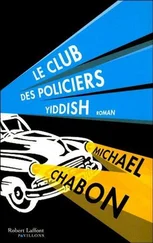Michael Chabon - The Yiddish Policemen's union
Здесь есть возможность читать онлайн «Michael Chabon - The Yiddish Policemen's union» — ознакомительный отрывок электронной книги совершенно бесплатно, а после прочтения отрывка купить полную версию. В некоторых случаях можно слушать аудио, скачать через торрент в формате fb2 и присутствует краткое содержание. Жанр: Альтернативная история, Полицейский детектив, на английском языке. Описание произведения, (предисловие) а так же отзывы посетителей доступны на портале библиотеки ЛибКат.
- Название:The Yiddish Policemen's union
- Автор:
- Жанр:
- Год:неизвестен
- ISBN:нет данных
- Рейтинг книги:5 / 5. Голосов: 1
-
Избранное:Добавить в избранное
- Отзывы:
-
Ваша оценка:
- 100
- 1
- 2
- 3
- 4
- 5
The Yiddish Policemen's union: краткое содержание, описание и аннотация
Предлагаем к чтению аннотацию, описание, краткое содержание или предисловие (зависит от того, что написал сам автор книги «The Yiddish Policemen's union»). Если вы не нашли необходимую информацию о книге — напишите в комментариях, мы постараемся отыскать её.
The Yiddish Policemen's union — читать онлайн ознакомительный отрывок
Ниже представлен текст книги, разбитый по страницам. Система сохранения места последней прочитанной страницы, позволяет с удобством читать онлайн бесплатно книгу «The Yiddish Policemen's union», без необходимости каждый раз заново искать на чём Вы остановились. Поставьте закладку, и сможете в любой момент перейти на страницу, на которой закончили чтение.
Интервал:
Закладка:
“That’s a new one,” Shpringer says. “Tying off with tefillin.”
“Now that I think about it,” Landsman says, “he had the look. Like maybe he used to be black hat. They take on a kind of a-I don’t know. They look shorn.”
Landsman pulls on a glove and, gripping Lasker’s chin, tilts from side to side the dead man’s head with its swollen mask of blood vessels. “If he used to wear a beard, then it was a while ago,” he says. “Skin tone on his face is even.”
He lets go of Lasker’s face and steps away from the body. It would not be quite accurate to say that he pegged Lasker for a former black hat. But with the chin of a fat boy, and the air of ruination, Landsman figured Lasker for having once been something more than a sockless junkie in a cheap hotel. He sighs. “What I wouldn’t give to be lying on the sunny beaches of Saskatoon.”
There are noises in the hallway, and the rattle of metal and straps, and the next moment two workers from the morgue come in with a collapsible gurney. Shpringer tells them to bring the evidence bin and the bags he has filled, and then lumbers out, one wheel of his trolley squeaking as he goes.
“Piece of shit,” Landsman informs the morgue boys, meaning the case, not the victim. This judgment does not appear to surprise or come to them as news. Landsman goes back up to his room to rejoin his bottle of slivovitz and the World’s Fair shot glass that has captured his affections. He sits down in the chair by the pressboard desk, with a dirty shirt for a seat cushion. He takes the Polaroid out of his pocket and studies the game that Lasker left behind, trying to decide whether the next move was to be White’s or Black’s, and what would be the next move after that. But there are too many pieces, and it is too difficult to hold the moves in his head, and Landsman doesn’t own anything like a chess set on which to lay it all out. After a few minutes he feels himself drifting off to sleep. But no, he isn’t going to do that, not when he knows that what awaits him are trite Escher dreams, woozy checkerboards, giant rooks casting phallic shadows.
He takes off his clothes, and steps under the shower, and lies down for half an hour with his eyes wide open, taking memories-of his little sister in her Super Cub, of Bina in the summer of 1986-out of their plastic bags. He studies them as if they are transcriptions, in a dusty book stolen from the library, of bygone checkmates and brilliancies. After half an hour of that useful pursuit, he gets up and puts on a clean shirt and tie, and goes down to Sitka Central to file his report.
5
Landsman learned to hate the game of chess at the hands of his father and his uncle Hertz. The brothers-in-law were boyhood friends back in Lodz, fellow members of the Makkabi Youth Chess Club. Landsman remembers how they used to talk about the day, in the summer of 1939, when the great Tartakower dropped by to put on a demonstration for the boys of the Makkabi. Savielly Tartakower was a Polish citizen, a grandmaster, and a character famous for having said “The blunders are all there on the board, waiting to be made.” He came from Paris to report on a tournament for a French chess journal and to visit with the director of the Makkabi Youth Chess Club, an old comrade from his days on the Russian front in the army of Franz Josef. At the director’s urging, Tartakower now proposed a game against the club’s best young player, Isidor Landsman.
They sat down together, the strapping war veteran in his bespoke suit and harsh good humor, and the stammering fifteen-year-old with a wall eye, a receding hairline, and a mustache that was often mistaken for a sooty thumbprint. Tartakower drew Black, and Landsman’s father chose the English Opening. For the first hour, Tartakower’s play was inattentive, even autonomic. He left his great chess engine idling and played by the book. Thirty-four moves in, with genial scorn, he offered Landsman’s father a draw. Landsman’s father needed to piss, his ears were ringing, he was only staving off the inevitable. But he declined. His game by now was based on nothing but feel and desperation. He reacted, he refused exchanges, his sole assets a stubborn nature and a wild sense of the board. After seventy moves and four hours and ten minutes of play, Tartakower, not so genial anymore, repeated his earlier offer. Landsman’s father, plagued by tinnitus, about to wet his pants, accepted. In later years Landsman’s father sometimes let on that his mind, that queer organ, never quite recovered from the ordeal of this game. But of course there were worse ordeals to come.
“That was not in the least enjoyable,” Tartakower is supposed to have told Landsman’s father, rising from his chair. Young Hertz Shemets, with his unfailing eye for weakness, spotted a tremor in Tartakower’s hand, holding a hastily fetched glass of Tokay. Then Tartakower pointed to Isidor Landsman’s skull. “But I’m sure it was preferable to being obliged to live in there.”
Not quite two years later, Hertz Shemets, his mother, and his kid sister, Freydl, arrived on Baranof Island, Alaska, with the first wave of Galitzer settlers. He came on the notorious Diamond, a World War I-era troop transport that Secretary Ickes ordered taken out of mothballs and rechristened as a left-handed memorial, or so legend has it, to the late Anthony Dimond, the Alaska Territory’s nonvoting delegate to the House of Representatives. (Until the fatal intervention on a Washington, D.C., street corner of a drunken, taxi-driving schlemiel named Denny Lanning-eternal hero of the Sitka Jews-Delegate Dimond had been on the verge of getting the Alaskan Settlement Act killed in committee.) Thin, pale, bewildered, Hertz Shemets stepped from the Diamond, from the dark and the reek of soup and rusty puddles, to the clean cold spice of Sitka pine. With his family and his people he was numbered, inoculated, deloused, tagged like a migrant bird by the stipulations of the Alaskan Settlement Act of 1940. In a cardboard pocketbook he carried an “Ickes passport,” a special emergency visa printed on special flimsy paper with special smeary ink.
There was nowhere else for him to go. It said so, in large type, on the front of an Ickes passport. He would not be permitted to travel to Seattle, or San Francisco, or even Juneau or Ketchikan. All the normal quotas on Jewish immigration to the United States remained in force. Even with the timely death of Dimond, the Act could not be forced up the American body politic without a certain amount of muscle and grease, and restrictions on Jewish movement were part of the deal.
On the heels of Jews from Germany and Austria, the Shemets family was dumped with their fellow Galitzers at Camp Slattery, in a muskeg swamp ten miles from the hard-bitten, half-decrepit town of Sitka, capital of the old Russian Alaska colony. In drafty, tin-roofed huts and barracks, they underwent six months of intensive acclimatization by a crack team of fifteen billion mosquitoes working under contract with the U.S. Interior Department. Hertz was conscripted for a road gang, then assigned to the crew that built the Sitka airfield. He lost two molars when he was smacked by a shovel, working a muck detail deep in a caisson sunk in the mud of Sitka harbor. In later years, whenever you drove with him over the Tshernovits Bridge, he would rub at his jaw, and his hard eyes in his sharp face would take on a wistful air. Freydl was sent to school in a chilly barn whose roof rang with steady rain. Their mother was taught the rudiments of agriculture, the use of plow, fertilizer, and irrigation hose. Brochures and posters held up the short Alaskan growing season as an allegory of the brief duration of her stay. Mrs. Shemets ought to think of the Sitka Settlement as a cellar or potting shed in which, like flower bulbs, she and her children could be put up for the winter, until their home soil thawed enough to allow them to be replanted there. No one imagined that the soil of Europe would be sowed so deeply with salt and ash.
Читать дальшеИнтервал:
Закладка:
Похожие книги на «The Yiddish Policemen's union»
Представляем Вашему вниманию похожие книги на «The Yiddish Policemen's union» списком для выбора. Мы отобрали схожую по названию и смыслу литературу в надежде предоставить читателям больше вариантов отыскать новые, интересные, ещё непрочитанные произведения.
Обсуждение, отзывы о книге «The Yiddish Policemen's union» и просто собственные мнения читателей. Оставьте ваши комментарии, напишите, что Вы думаете о произведении, его смысле или главных героях. Укажите что конкретно понравилось, а что нет, и почему Вы так считаете.












